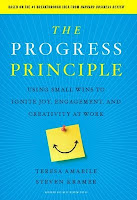The Progress Principle
Coert Visser, Juli 1, 2012
In 2011, Teresa Amabile, a professor of Business Administration at Harvard Business School and Steven Kramer, a developmental psychologist published the book The Progress Principle: Using Small Wins to Ignite Joy, Engagement, and Creativity at Work which is one of the most compelling cases yet for focusing on progress in work. In the book they report on a large scale study into worker performance and motivation.
One thing Amabile and Kramer did was to survey more than 600 managers from dozens of companies, asking them to rank the impact on employee motivation and emotions of five workplace factors: recognition for good work, incentives, interpersonal support, making progress and clear goals. The majority of these managers, chose “recognition for good work”. But a multiyear study which tracked day-to-day activities of 238 people in 26 project teams in 7 companies in 3 industries showed that these managers were not right about this.
The study examined the relationships between workday evens, inner work life (the perceptions, emotions and motivation of the individual) and individual performance (creativity, productivity, work commitment, and collegiality). The primary finding of the study was that three types of events had the most positive impact on work life and performance: 1) progress in meaningful work, 2) catalysts (events that directly help project work), and 3) nourishers (interpersonal events that uplift the people doing the work). Of these three factors, progress was by far the most powerful. The negative opposites of these three factors (setbacks, inhibitors, and toxins) had negative effects on worklife and performance. Their effect turned out to be much stronger than that of the positive factors. Even small progress and setbacks often had strong effects on inner work life.
I have made this figure to summarize the main findings of the study:
Question: What do you think about this research?
In 2011, Teresa Amabile, a professor of Business Administration at Harvard Business School and Steven Kramer, a developmental psychologist published the book The Progress Principle: Using Small Wins to Ignite Joy, Engagement, and Creativity at Work which is one of the most compelling cases yet for focusing on progress in work. In the book they report on a large scale study into worker performance and motivation.
One thing Amabile and Kramer did was to survey more than 600 managers from dozens of companies, asking them to rank the impact on employee motivation and emotions of five workplace factors: recognition for good work, incentives, interpersonal support, making progress and clear goals. The majority of these managers, chose “recognition for good work”. But a multiyear study which tracked day-to-day activities of 238 people in 26 project teams in 7 companies in 3 industries showed that these managers were not right about this.
The study examined the relationships between workday evens, inner work life (the perceptions, emotions and motivation of the individual) and individual performance (creativity, productivity, work commitment, and collegiality). The primary finding of the study was that three types of events had the most positive impact on work life and performance: 1) progress in meaningful work, 2) catalysts (events that directly help project work), and 3) nourishers (interpersonal events that uplift the people doing the work). Of these three factors, progress was by far the most powerful. The negative opposites of these three factors (setbacks, inhibitors, and toxins) had negative effects on worklife and performance. Their effect turned out to be much stronger than that of the positive factors. Even small progress and setbacks often had strong effects on inner work life.
I have made this figure to summarize the main findings of the study:
Question: What do you think about this research?



Comments